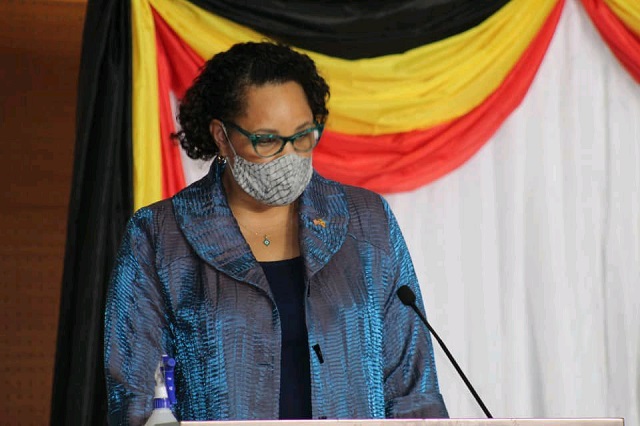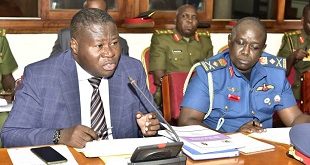
Kampala, Uganda | THE INDEPENDENT | The US Ambassador to Uganda Natalie E. Brown has asked Ugandans to step up the fight against corruption as the country prepares for the 2021 elections.
Natalie was on Wednesday speaking at the National Anti-corruption Conference 2020 at Sheraton Hotel. The conference was held today as the world marks the International Anti-corruption Day under the theme ‘Promoting Social Accountability through Active Citizenry’.
In her statement, Ambassador Brown said that corruption can also undermine electoral processes and that the donor community remains concerned by the level of voter bribery in the country.
Election campaigns in Uganda kicked off on 9th November and are expected to close on 12th January 2021 after which Ugandans will go to polls to elect their President and Members of Parliament on January 14th, 2021.
However, the pre-campaign study by the Alliance for Finance Monitoring (ACFIM) conducted in one-fifth of Uganda’s districts found that aspirants for Parliament, district chairpersons and mayorship had spent at least 250 billion shillings three months before the official campaign kicked off. This would loosely put the expenditure for that level of aspirants in the whole country at five times that which would amount to about one and a quarter trillion shillings.
The research conducted between July 2019 and July 2020, established that this money was spent on buying political support from voters. Among the items on which it was spent were economic empowerment projects, Covid-19 relief and supplies, support to schools, road extensions, ambulance services, immediate cash needs, publicity, campaign administration and social contributions.
The survey which was conducted in 29 districts, 70 constituencies and 14,169 villages across the country targeted 939 aspirants. Of these, 615 were aspirants interested in becoming directly elected Members of Parliament, 151 district women representative aspirants, 116 district aspirants and 57 persons aspiring for mayorship.
Ambassador Brown says that this cost of contesting for a political seat has risen so high.
“To become a Member of Parliament in 2021, a person requires not less than 500 million Shillings. This amount is staggering considering that just a little over a year ago before the pandemic, Uganda’s per capita GDP was 800 Dollars,” she said in part.
Natalie added that it was unfortunate that vote-buying through the provision of money, goods or services is a widespread practice. She also noted that it was not only aspirants offering bribes but that also many citizens are expecting or even requesting bribes.
According to the Ambassador, both acts compromise the democratic process and are disrespectful to the citizens and their interests.
Natalie said that the culture of selling democratic rights is a form of corruption that needs to be rejected and that one way that all Ugandans citizens can step up against corruption in the next few weeks is to reject voter bribery.
The AFCIM report recommended that the government comes up with laws that allow candidates to freely fundraise resources especially internally to finance their campaigns without victimization.
Felix Kafuuma, a programme’s officer at ACFIM advised candidates to borrow a leaf from developed democracies where candidates don’t spend their resources but rather from public fundraising.
******
URN
 The Independent Uganda: You get the Truth we Pay the Price
The Independent Uganda: You get the Truth we Pay the Price


